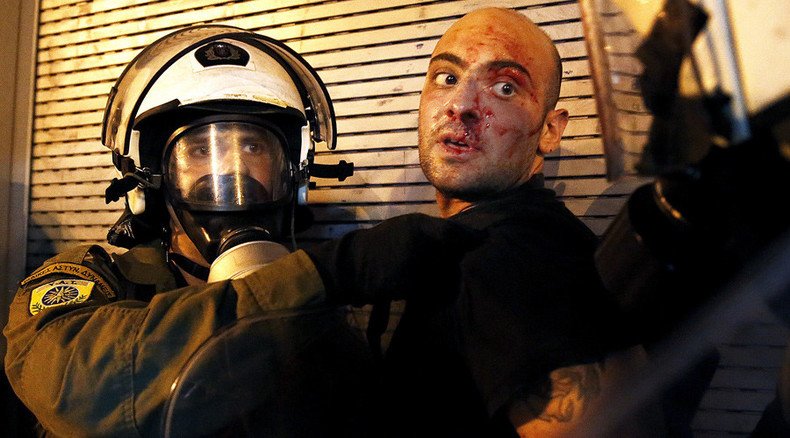‘Greek society is ready to discuss radical alternatives’

During the last five years Greece has been a laboratory animal, an experiment in extreme neoliberalism. Today we are seeing the limit of the thinking of the leadership of Syriza, says Panagiotis Sotiris from the University of the Aegean.
The Greek parliament approved tough reforms imposed by international creditors to secure a financial bailout. The new austerity plan was passed overwhelmingly: 229 MPs voted 'Yes' compared to 64 who voted 'No'. Before the vote there were large anti-austerity rallies in Athens on Wednesday.
RT: How angry are people in Greece and could this unrest continue?
Panagiotis Sotiris: There is going to be unrest in the near future because the Greek government has capitulated to the demands of our EU creditors and has introduced yet another bailout packet that is filled with austerity, and it will also lead to more recession and more unemployment. So I think that in the near future we will see much more protests, and I don’t mean just the kind of ritualistic protests by anarchists such as the one we witnessed [on Wednesday], I mean a confrontation with society. In a certain way the Greek government is turning against the very segments of the population that supported it, brought it to power and also massively voted in favor of the ‘No’ vote in the referendum. So this is the main aspect of [Wednesday] - the rupture of Syriza with its own electorate, with those segments of society that had placed hope upon Syriza.

RT: Alexis Tsipras admitted he didn't believe in the deal, but the bill has still passed - why?
PS: He didn't believe in this deal because it’s very negative. It’s filled with austerity, with neoliberal reforms; there is no place for democratic procedure, for popular sovereignty in this deal. It’s as if the government will not be able to actually govern; decisions will be dictated by our creditors and in this sense he obviously is not in agreement with the deal but the result is that he has accepted it. And the reason he has accepted it is that he could not think of an alternative.
What we are seeing is the limit of the thinking of the leadership of Syriza, because obviously the only other alternative could have been a rupture with the EU, an exit from the eurozone. They were not ready either to prepare for it, or even accept it as a possible solution. So if you are not ready for the rupture then you are going to capitulate. This was also the lesson from Cyprus and Syriza didn’t take it and the lesson was: If you do not accept austerity the (first pack they offer you?) and you are not ready for a rupture, you are not ready for an exit from the eurozone, then you will have to accept the second deal, and the second deal is always worse than the first.
READ MORE: Greek MPs approve reforms for new EU bailout
RT: There were mass solidarity rallies in support of Greeks all over the world. Why is this being felt by so many people?
PS: Because they realize that Greece has been in the past five years an experiment in a certain way like a laboratory animal for an experiment in extreme neoliberalism and they realize the suffering of the Greek people. They are also in solidarity to the Greek people because Greek society has resisted, it has struggled against austerity, the last example of this struggle being the massive vote in favor of the ‘No’ and I think this kind of solidarity is very important, it means that we are not alone. I wish that the Greek government had realized that the real power is there, in solidarity and the movement, and not in whatever benevolence our creditors might have which they do not have.
RT: But that public discontent didn't change the way Parliament voted. What is going to happen next?
PS: I think that this is just the beginning of a new phase. This deal is not going to be so easily implemented, both in terms of its social consequences, but also in its economic aspects. In a certain way it is an unsustainable deal and I think that at least Greek society is much more ready today to discuss radical alternatives, including the exit from the eurozone.
The statements, views and opinions expressed in this column are solely those of the author and do not necessarily represent those of RT.
The statements, views and opinions expressed in this column are solely those of the author and do not necessarily represent those of RT.












